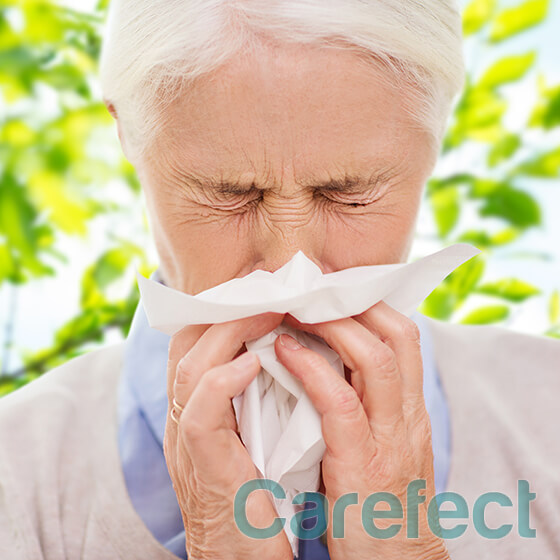Winter is over and, just as animals come out of hibernation, so do people come out to enjoy the beautiful nature of springtime. However, for about five percent of the population, the impending springtime comes not only with beautiful flowers but also with seasonal allergies. Just as the cold bite of air is left to the winter days, warm springtime comes with its own challenges. Beautiful flowers may appeal to many seniors and some people even plan special trips around the blooming of certain flowers, for example, the traditional practice of picnicking during cherry blossom season. The blooming of flowers may look beautiful but can present their own challenges due to airborne pollen. Environmental pollen increases in the springtime which begins to provoke allergies.
Symptoms of Allergies
Most people may think of allergies as being a mild irritation to the eyes and nasal cavity. However, allergies can range from mild to severe and the onslaught can be acute or chronic. Each person will have allergies that manifest in different ways based on how their body’s immune system reacts to the allergen. As well, each allergen will invoke a different response from a little itchiness to anaphylactic shock. Be mindful of your elderly loved one’s specific circumstances and how well their immune system will be able to withstand the allergy.
Rhinitis
Rhinitis is your body’s reaction to spring-related allergens in the form of creating inflammation in the mucous membranes inside the nose. Allergens, such as pollen, can invoke rhinitis symptoms including itchiness in the facial cavities such as the nose, eyes, and mouth. Rhinitis in seniors can present itself in different ways as they are more prone to watery eyes, congestion, runny nose, and sneezing.
Sinusitis
If rhinitis is left untreated, the elderly can develop a worsened condition known as sinusitis. Sinusitis is a chronic condition that leads to ongoing inflammation in the facial cavities. Symptoms of sinusitis included chronic and worsened pressure in the face, and persistent cough and congestion.
Spring Safety Tips for Allergies
Medications
Seasonal allergies can be mild or severe so it is important to consult your elderly loved one’s family doctor. Depending on their specific circumstances, their doctor can prescribe the most effective medication based on the individual allergy. It is important that your doctor is consulted while taking new medications in order to ensure that any medications do not interfere with the existing medication. This is especially significant for seniors due to the fact that antihistamines are the most commonly prescribed medication for allergies but seniors would do well to avoid them due to the various side effects. Antihistamines can cause confusion, dizziness, urinary issues, drowsiness, and dry mouth and eyes. Antihistamines are also known to cause emotional disruptions such as mood swings, insomnia, and negative behavioral changes in seniors. Due to the negative side effects of antihistamines, doctors may prescribe a nasal steroid or topical medication to seniors.
Keep the Allergens Outdoors
While it is not always reasonable for seniors to stay inside, it is important to keep the outside allergens, outside. Staying inside on days when the pollen count is high, may be convenient for seniors with severe allergies. Days that are dry and windy spread pollen throughout the environment while days that follow heavy rain see a reduction in allergens. So close the windows during windy warm days in order to minimize the effects of pollen in your home. An air conditioner inside your home can also help filter out the allergens as there are high-efficiency air filters available. Keeping the windows closed in your home and in your car can help keep the pollen away from spaces you spend a lot of time. Running a dehumidifier can also help keep the inside of your home dry which will reduce allergens that thrive in moisture. If your elderly loved one loves the outdoors but suffers from pollen allergies ensure that they are washing off the allergens from their clothes by changing into a new outfit after gardening and putting those clothes directly into the washing machine. Wearing sunglasses when outdoors can not only protect your eyes from sun damage but also can shield your eyes from wind-blown allergens.
Protecting your elderly loved ones from springtime allergens is important for keeping them comfortable and safe. Ensure you are connecting with their family doctor prior to taking any over-the-counter medications and also if their symptoms worsen. Their doctor will be able to create a plan that is best for them.
If you enjoyed this article, we also recommend these related posts in our Home Care Services blog:

